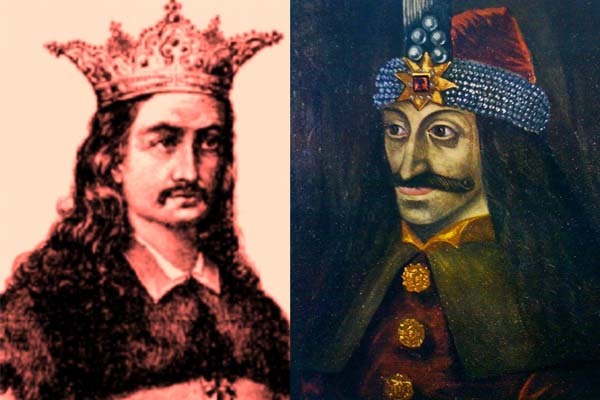- Ortega Brothers: A novel of tyrants with sister-in-law and retaliation
- Jorge and Carlos Semprún. All a life of resquemor
- Mann Brothers Blue Angels Among Suicides
Unhappy families also look alike. First they get sick from longing for an idealized past that was lost in heartbreak or in the decoupling; then they turn that longing into reproach and then self-destruction. Then, some brothers are pragmatic and escape the melancholy as they can while others get stuck in their resentment and all hate each other, each for their reason. Well: there are also brothers who, in adversity, come together like a pineapple . They are admirable, but this is not their page.
Vlad Dracula, the true Dracula who reinvented Bram Stoker, also had his paradise lost, his little bit of nostalgia that turned to anger, just as he had a handsome and pragmatic brother to direct his frustration. Some clarification on the name: Dracul, which means dragon but also devil, was the nickname that Vlad's father earned when he entered the Order of the Dragon, a society of rulers from all over Europe engaged in the defense of Christianity. The derivative "Dracula", used by Bram Stoker, is not a license: Vlad son was called Draculae , the son of the Dragon. His brother had a better alias: Radu cel Frumos , Radu el bello.
Who were these people? Vlad II had been the prince of Wallachia, a buffer state between the Ottoman Empire and the Central European Christian kingdoms: Hungary, Poland, the Holy Roman Empire ... His territory was the Danube plain and, with less certainty, the Transylvanian mountains , and its time was that of the fall of Byzantium and the Ottoman apogee. He was a successful warrior but the years forced him to pragmatism. During his reign, Valaquia agreed first with some and then with others and sometimes with all at once.
In one of those commitments came the drama that changed the lives of Vlad son and his brother Radu. His father had to hand them over to the Ottomans as guarantors of their loyalty according to a protocol whereby the hostages would receive the most sophisticated education of the children of the visires . Thus, the Turks hoped to make them allied politicians in the future. On the one hand, the boys were privileged; on the other, they were creatures permanently threatened with death. In the case of Vlad and Radu, their future became even more fragile when Vlad father and his half-brother Mircea were burned at a stake, victims of the Hungarians.
This is where their paths separate. According to Dracula, Prince of many faces , the biography of Radu Florescu and Raymond T. McNally (1989), Vlad became a brutal and angry pupil, while Radu preferred collaborationism. Let's talk about Radu and his nickname. The chronicles describe him as a handsome young man with fine features that caused trouble in the castle of Egrigoz, his golden cage. Mehmed, heir to the sultanate, wanted to make him his lover. Radu resisted courting some time, not much, and later became his pawn. Beside him, Vlad, an intolerant and patriotic moralist, gave Radu his worst contempt.
Although, in reality, the Ottomans also counted on Vlad being his boy. Therefore, he was released in 1448 and equipped to recover the throne of Valaquia. They did not know the beast they unleashed .
Military beast and political beast. The most interesting thesis of Florescu and McNally is that Vlad Dracula was a radically modern leader, who acted with Machiavelli's logic half a century early. Even his mad violence, odious as it may seem to us today, had a pragmatic sense. Dracula began by killing his cousins, whom the Hungarians had placed on the throne of Wallachia; then he went for the boyars, the aristocracy that sabotaged his centralized and modern state project and followed by German merchants living in Transylvania, Catholics, Gypsies, adulterous women ... For all he had a reason.
What was wrong with Vlad? According to Florescu and McNally, Dracula mixed his brutal political intelligence, the fury for his family grievances and the culture of cruelty learned from the Ottomans, who, among other things, taught him that of impaling his enemies. Speaking of impalement: his biographers drop twice that the obsession with stakes indicates that Vlad was impotent , but they also remember that he had three children and recognize that Piscohistoric studies are all very problematic.
If a reader is Romanian, he may protest. In his country, Dracula is a hero who achieved impossible military victories against the Hungarians and the Ottomans. The campaign in which he defeated Mehmed, based on terror and biological warfare (he sent the stinkers to infect the invaders) was a miracle that did not last long. The tension was so exhausting that Dracula imposed on his subjects that, in the end, everyone was willing to take the hero off. Mehmed, then, remembered the handsome Radu and agreed to his conquest of power with Hungarians, Germans and Boyars.
So pragmatism could what the Ottoman Army did not achieve. Dracula fell and Radu reigned, even if briefly. He died of syphilis, while his brother resigned himself to being a kind of Napoleon in Saint Helena, luxuriously imprisoned in Pest .
We can only talk about the Dracula of Bram Stoker. Two simple ideas: one, Stoker was never in Romania but all the historical and geographical information of his novel is correct. Bravo for him. And two: Radu peeks through the book in a dismissive reference. The strange thing is that nobody has taken that thread to mount another novel.
According to the criteria of The Trust Project
Know more- history
- culture
- literature
- books
Literature: John Kennedy Toole, Misadventures of a Clumsy Lover
The Paper Sphere Books in the August Sun
Literature María Elvira Roca Barea: "Since 1992 the common house has been gradually destroyed"

